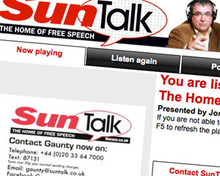
Gaunt, who now presents the Sun online radio show, SunTalk, argues that the fight represents a broader aim of protecting a free press and media.
"It is vital in modern 21st century British democracy that the press and media are free to robustly challenge elected representatives without fear or favour," he said, in a release issued on Monday.
He was sacked from radio station TalkSPORT in 2008 for calling councillor Michael Stark an "ignorant pig" and "health nazi" in a live interview about children in care.
Gaunt was later and separately censured by broadcasting regulator Ofcom in May 2009 for a "bullying" and offensive interview.
Gaunt believes Ofcom infringed his right to freedom of speech under Article 10 of the Human Rights Convention and in January 2010, Gaunt, supported by human rights organisation Liberty, won the right to take the challenge to the high court.
In a statement given to Journalism.co.uk today, Ofcom said: "Parliament gave Ofcom a duty to ensure that whilst standards in programmes are maintained, the right to freedom of expression is also protected.
"Ofcom regularly makes decisions under the Broadcasting Code that respect and balance these principles.
"In this case, Ofcom found Jon Gaunt's interview to be a breach of generally accepted standards. We believe the breach finding was proportionate."
In a release issued ahead of today's case, Martin Howe, Jon Gaunt's solicitor, said: "A free press and media is an essential and fundamental ingredient of meaningful democracy.
"Broadcasters should be free to test our elected politicians on matters such as expenses, front-line cuts, terror policies, and the prosecution of wars.
"In Jon Gaunt's case he should be free to challenge a controversial childcare policy. Presenters in political debate should not be looking over their shoulder waiting for the Ofcom gag to be slapped on.
"Tyranny triumphs when good men are silenced. Our democracy has more to fear from faceless bureaucrats thumbing their thesaurus than from the plain speaking polemic of Jon Gaunt".
The case is to be heard in the Royal Courts of Justice in London on 15-16 June.
Free daily newsletter
If you like our news and feature articles, you can sign up to receive our free daily (Mon-Fri) email newsletter (mobile friendly).
Related articles
- The freedom gap: what pay and class reveal about the future of journalism
- 16 free sources of data on the media industry
- "No longer can a news outlet’s name guarantee the audience will come and stay"
- #JournalismMatters: The challenges of journalism in exile
- What to do if you are threatened with a SLAPP lawsuit











